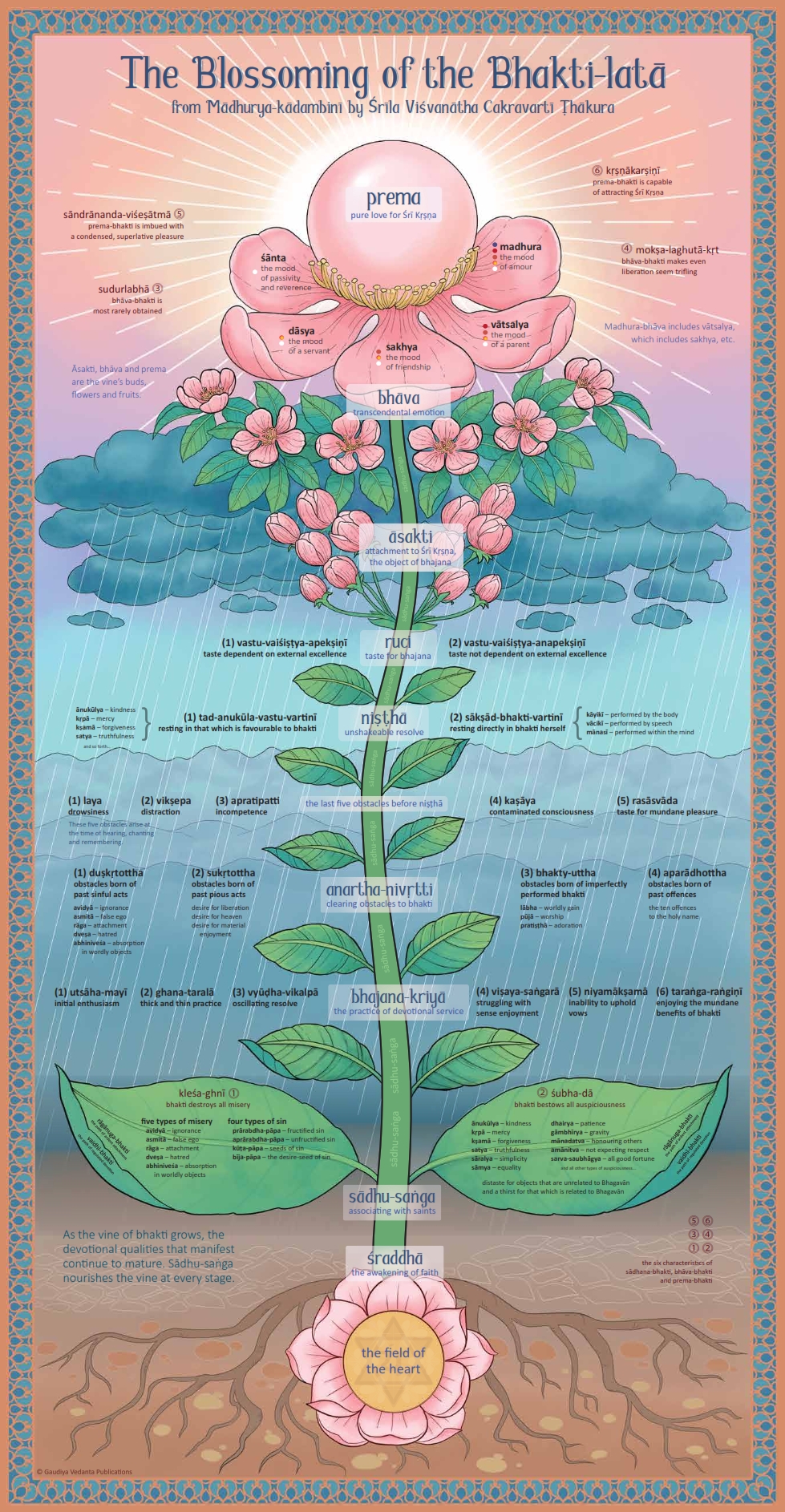 Prema-prayojana dāsa: We practice sādhana in order to attain rati. In our line, as followers of Śrīla Rūpa Gosvāmī, do we want to attain rati for Kṛṣṇa, or Rādhā, or Rādhā-Kṛṣṇa?
Prema-prayojana dāsa: We practice sādhana in order to attain rati. In our line, as followers of Śrīla Rūpa Gosvāmī, do we want to attain rati for Kṛṣṇa, or Rādhā, or Rādhā-Kṛṣṇa?
Śrīla Bhaktivedānta Nārāyaṇa Mahārāja: There is some difference in reply for people in general and for special devotees. A person acts according to his qualification.
First bhāva, śuddha-sattva, should come. Then one will actually have the qualification to decide which associate he wants to follow. When his consciousness is free from all material covering and he becomes completely pure, the pure mood of śuddha-sattva will enter his heart. He will then know his own spiritual identity and what service he wants to perform.
Prema-prayojana dāsa: What is the speciality of those devotees in the line of Śrīla Rūpa Gosvāmī, the rūpānugas?
Śrīla Bhaktivedānta Nārāyaṇa Mahārāja: In the form of Śrī Rūpa Mañjarī in kṛṣṇa-līlā, Śrīla Rūpa Gosvāmī personally performs activities such as these:
tāmbūlārpaṇa-pāda-mardana-payo-dānābhisārādibhir
vṛndāraṇya-maheśvarīpriyatayā yās toṣayanti priyāḥ
prāṇa-preṣṭha-sakhī-kulād api kilāsaṅkocitā bhūmikāḥ
keli-bhūmiṣu rūpa-mañjarī-mukhās tā dāsikāḥ saṁśraye
(Vraja-vilāsa-stava, Verse 38)
I take shelter of Śrī Rūpa Mañjarī and the other maidservants of Śrīmatī Rādhārāṇī, the great Queen of Vṛndāvana. Those maidservants perpetually satisfy Her by their loving services, such as offering Her betel nuts, massaging Her feet, bringing Her water, and arranging for Her meetings with Lord Kṛṣṇa. The prāṇa-preṣṭha sakhīs are dearer to Śrīmatī Rādhikā than Her very life, but these maidservants are still more dear, because without feeling shy they can enter the area where the Divine Couple enjoy Their most confidential pastimes.
Rūpa Gosvāmī is an eternal associate of Caitanya Mahāprabhu in gaura-līlā, and he is Rūpa Mañjarī in Kṛṣṇa’s 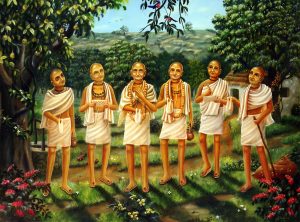 pastimes. Rūpa Mañjarī’s service is rādhā-dāsya, the service of Śrīmatī Rādhārāṇī. Rūpānuga devotees are followers of Rūpa Gosvāmī in his form as the personal associate of Śrī Caitanya Mahāprabhu and in his form as Rūpa Mañjarī, the leader of the maidservants of Śrīmatī Rādhikā.
pastimes. Rūpa Mañjarī’s service is rādhā-dāsya, the service of Śrīmatī Rādhārāṇī. Rūpānuga devotees are followers of Rūpa Gosvāmī in his form as the personal associate of Śrī Caitanya Mahāprabhu and in his form as Rūpa Mañjarī, the leader of the maidservants of Śrīmatī Rādhikā.
Prema-prayojana dāsa: Is it that Rūpa Mañjarī’s rati for Rādhikā is her sthāyī-bhāva and her rati for Kṛṣṇa is a sañcārī-bhāva, or is it that her rati for Kṛṣṇa is her sthāyī-bhāva and her rati for Rādhikā is a sañcārī-bhāva?
Śrīla Bhaktivedānta Nārāyaṇa Mahārāja: Śrī Rūpa Mañjarī’s entire existence is dedicated to Śrīmatī Rādhikā, and she sees Kṛṣṇa as Rādhikā’s most beloved. Thus, when at any time Kṛṣṇa comes to Rādhikā and performs some loving pastime with Her, a sañcārī-bhāva comes in Rūpa Mañjarī’s heart. For example, if Kṛṣṇa is embracing Rādhikā, Rūpa Mañjarī thinks, “That embrace is coming to me.” Her rati for Rādhā and Kṛṣṇa accords with this understanding.
Prāṇa-govinda dāsa: Śrīla Gurudeva, you said that when śuddha-sattva comes in one’s heart by serving under the guidance of śrī guru, that person will realize his svarūpa. If the svarūpa of the disciple is in sakhya-rasa (the mood of a cowherd friend of Kṛṣṇa) and the guru reveals to him the guru’s own svarūpa in dāsya-rasa (the mood of a servant)…
Śrīla Bhaktivedānta Nārāyaṇa Mahārāja: This cannot occur. If the disciple is in a certain rasa, it is absurd to think that a real guru does not know this and is in another, lower, rasa. If a guru does not know the svarūpa of his disciple, he is not guru. It means that he himself is not situated in śuddha-sattva. How can he help his disciple?
Prema-prayojana dāsa: Gurudeva, I have a difficult question. He asked an easy question; I have a difficult one.
In Bhakti-rasāmṛta-sindu, Śrīla Rūpa Gosvāmī says that if a devotee has got some rati, but he commits some offense, then he may receive one of two reactions: His rati may become rati-ābhāsa, or his rati may go down to a lower rasa. If he is in a higher rasa, his rati will go to a lower rasa. My question is: Will that rati go down to a lower rasa forever, or only until the effect of the offense wears off, and then maybe go back?
Śrīla Bhaktivedānta Nārāyaṇa Mahārāja: If that devotee commits an offense, he comes down. If his offense is very, very grave, his rati will disappear forever. If His offense is not so great, then, by good association, it may return.
Prema-prayojana dāsa: If, for example, the devotee is in sakhya-rasa, he can go down to dāsya-rasa, and then when the reaction to his offense is gone, he can still go back to sākhya-rasa?
Śrīla Bhaktivedānta Nārāyaṇa Mahārāja: When rati, or śuddha-sattva comes, it is very rare for a devotee to commit any offense. We see this only in the life of Bharata and Citraketu Mahārāja, but even in those two examples, they did not really fall down. What they did was due to the wish of Kṛṣṇa.
Śrīpāda Mādhava Mahārāja: It was only to give some instruction to the world.
Mukunda dāsa: Śrīla Gurudeva, I have one question. You spoke about guru-tattva on the first night. You said that when the guru gives the disciple a relationship with Kṛṣṇa at the time of dīkṣā, brahminical initiation, it means he is giving it ‘in seed form.’ Some people are thinking that this means siddha-praṇālī, so they are confused.
Śrīla Bhaktivedānta Nārāyaṇa Mahārāja: No. Until one performs pure bhajana to the extent anarthas have left his heart, one’s siddha-deha (one’s spiritual body, which is fit for serving Rādhā and Kṛṣṇa) cannot manifest. It may come at the stage of rati (bhāva-bhakti).
One must first attain the stages of śraddhā, bhajana-kriyā, niṣṭhā, ruci, āsakti, and after that stage śuddha-sattva will come, and then the devotee will be siddha (perfectly self-realized). Those who try to imagine their siddha-deha will be like the sahajiyā bābājīs at Rādhā-kuṇḍa, all of whom partake in immoral relationships with widows and perhaps even have sons from these relationships.
Devotee: Śrīla Bhaktisiddhānta Sarasvatī Ṭhākura says that the true disciple should seek internal and external darśana (audience) of śrī guru. Can you explain this further?
Śrīla Bhaktivedānta Nārāyaṇa Mahārāja: Following śrī guru’s words of instruction is internal darśana. Watching his behaviour and the way in which he performs his activities is external darśana. If your guru is still physically present in the world, you can also personally serve him.
Mahābuddhi dāsa: How do we become serious about this process?
Śrīla Bhaktivedānta Nārāyaṇa Mahārāja: By engaging in pure bhakti as described in this verse:
anyābhilāṣitā-śūnyaṁ
jñāna-karmādy-anāvrṭam
ānukūlyena kṛṣṇānu
śīlanam bhaktir uttamā
(Bhakti-rasāmṛta-sindhu 1.1.11)
The cultivation of activities that are meant exclusively for the pleasure of Śrī Kṛṣṇa, or in other words the uninterrupted flow of service to Śrī Kṛṣṇa, performed through all endeavours of the body, mind, and speech, and through the expression of various spiritual sentiments (bhāvas), which is not covered by jñāna (knowledge aimed at impersonal liberation) and karma (rewardseeking activity), which is performed under the guidance of Śrī Kṛṣṇa’s uttama-bhaktas, and which is devoid of all desires other than the aspiration to bring happiness to Śrī Kṛṣṇa, is called uttama-bhakti, or pure devotional service.
Try to follow uttama-bhakti, the principles of topmost pure devotion. When, under the guidance of śrī guru and the Vaiṣṇavas, all your energy and all the activities of your mind, body, and words are engaged continuously like the flow of honey and aimed at the goal of pure bhakti, your activities will then be called bhakti. Worldly desires, such as jñāna (mental speculation with the desire to merge in an impersonal God), karma (the desire to personally enjoy the fruits of action), yoga (exercises), and tapasya (austerity performed for a worldly end) have no place in the heart of the devotee.
Begin from śraddhā (initial faith) and try to progress to niṣṭhā (steadiness), ruci (taste for devotional activities), āsakti (natural attachment for Kṛṣṇa), and then to śuddha-sattva, rati (the stage of spiritual emotions).
Śrīpāda Tridaṇḍi Mahārāja: Śrīla Gurudeva, can you explain the difference between śuddha-sattva and viśuddha-sattva? Śuddha-sattva is pure existence, and viśuddha-sattva is more than that?
Śrīla Bhaktivedānta Nārāyaṇa Mahārāja: Kṛṣṇa and His incarnations, and also His eternal associates like the gopīs, Nanda Bābā, and Yaśodā Maiyā are viśuddha-sattva. When the jīva becomes pure, he becomes śuddha-sattva.
sattvaṁ viśuddhaṁ vasudeva-śabditaṁ
yadīyate tatra pumān apāvṛtaḥ
sattve ca tasmin bhagavān vāsudevo
hy adhokṣajo me namasā vidhīyate
(Śrīmad-Bhāgavatam 4.3.23)
I am always engaged in offering obeisances to Lord Vāsudeva in pure Kṛṣṇa consciousness. Kṛṣṇa consciousness is always pure consciousness, in which the Supreme Personality of Godhead, known as Vāsudeva, is revealed without any covering.
Śrīpāda Mādhava Mahārāja: Śrīla Gurudeva explained in Mathurā that sattva means ‘existence;’ miśra-sattva 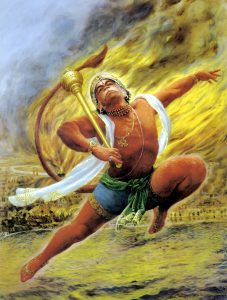 refers to existence mixed with the three modes of material nature, which is the state of the conditioned souls; śuddha-sattva refers to liberated souls, those who have attained perfection; and finally viśuddha-sattva refers to Kṛṣṇa and His eternal associates.
refers to existence mixed with the three modes of material nature, which is the state of the conditioned souls; śuddha-sattva refers to liberated souls, those who have attained perfection; and finally viśuddha-sattva refers to Kṛṣṇa and His eternal associates.
Śrīpāda Tridaṇḍi Mahārāja: What about Hanumānjī?
Śrīla Bhaktivedānta Nārāyaṇa Mahārāja: He is viśuddha-sattva, because he is an eternal associate of Lord Rāmacandra. He is not a jīva; he is a manifestation of Sadāśiva (a form of Lord Viṣṇu).
Vrajanātha dāsa: Śrīla Gurudeva, when the jīva attains perfection, does he also become viśuddha-sattva?
Śrīla Bhaktivedānta Nārāyaṇa Mahārāja: No, never.
Śrīpāda Tridaṇḍi Mahārāja: We can only come to śuddha-sattva?
Śrīpāda Padmanābha Mahārāja: Like a particle of a ray of prema, śuddha-sattva viśeṣātmā (the transcendental platform of pure goodness) descends into the sādhaka’s heart from the hearts of the viśuddha-sattva eternal associates of the Lord. So when that jīva enters Goloka, he does not become viśuddha-sattva?
Śrīla Bhaktivedānta Nārāyaṇa Mahārāja: No, never. Whether they have come from Baladeva Prabhu, Saṅkarṣaṇa, or Kāraṇodakaśāyī, they are always śuddha-sattva.
Raghunātha Bhaṭṭa dāsa: Some devotees are saying that when the jīvas become sādhana-siddha (self-realized by the performance of sādhana-bhakti) or kṛpā-siddha (self-realized by the mercy of guru and Kṛṣṇa), they become equal to the nitya-siddhas (the eternally perfect associates of the Lord) in all respects. But I heard that anugatya (service under proper guidance) is required for sādhana-siddha and kṛpā-siddha, and now you just mentioned that the sādhana-siddha jīvas can only reach śuddha-sattva, not viśuddha-sattva.
Śrīla Bhaktivedānta Nārāyaṇa Mahārāja: When jīvas become siddha (perfect), they will have a body like that of the gopīs or the other Vrajavāsīs. They have equal opportunity to serve, but still they are śuddha-sattva.
Śrīpāda Padmanābha Mahārāja: One last question remains about śuddha-sattva and viśuddha-sattva. You said that śuddha-sattva manifests when the taṭasthā-jīva attains perfection in the spiritual world. When someone becomes liberated (mukta) but attains only Brahman (the impersonal aspect of the Lord), is that miśra-sattva or śuddha-sattva?
Śrīla Bhaktivedānta Nārāyaṇa Mahārāja: There is neither śuddha-sattva nor viśuddha-sattva, nor any sattva. In Brahman there is no differentiation.
Vṛndāvana dāsa: I have heard that Śrīla Bhaktivedānta Svāmī Mahārāja sometimes said that those who attain the brahma-jyoti would again come down into the material world; that they would fall from that position.
Śrīla Bhaktivedānta Nārāyaṇa Mahārāja: It has been told in Śrīmad-Bhāgavatam:
ye ’nye ’ravindākṣa vimukta-māninas
tvayy asta-bhāvād aviśuddha-buddhayaḥ
āruhya kṛcchreṇa paraṁ padaṁ tataḥ
patanty adho ’nādṛta-yuṣmad-aṅghrayaḥ
(Śrīmad-Bhāgavatam 10.2.32)
O lotus-eyed Lord, although non-devotees who accept severe austerities and penances to achieve the highest position may think themselves liberated, their intelligence is impure. They fall down from their position of imagined superiority because they have no regard for Your lotus feet.
They imagine that they are liberated, but actually they are not. They fall down from their imagined position.
Vṛndāvana dāsa: If they attain sāyujya-mukti, is it not like annihilation of any relationship?
Śrīla Bhaktivedānta Nārāyaṇa Mahārāja: The soul exists, but there is no activity in his being. He is completely unconscious. His existence is not fully gone. Existence is there, but he cannot realize anything.
Vṛndāvana dāsa: Can they come again to the material world?
Śrīla Bhaktivedānta Nārāyaṇa Mahārāja: They will not come. Moreover, they have no chance to do bhakti. That is why it has been told in śāstra that mukti is like a tigress. Mukti-vyāghryāḥ. Like a tigress, mukti swallows us. If a tiger eats someone, that person does not remain alive. It is explained in Śrī Bṛhad-bhāgavatāmṛta that if a great soul’s glance lands upon the living entity stuck in the brahmajyoti while that great soul is travelling through it, that particular living entity may be released. This is the only way for such release.
Balarāma dāsa: Śrīla Gurudeva, is it possible for a jīva in a Western body to achieve the stage of bhāva? Are there any examples?
Śrīla Bhaktivedānta Nārāyaṇa Mahārāja: I have not seen that statement written, but it can happen anywhere in  the world. If one has very high-class devotee association and he is practicing bhakti in the proper manner, he may achieve bhāva – but it is very rare.
the world. If one has very high-class devotee association and he is practicing bhakti in the proper manner, he may achieve bhāva – but it is very rare.
Western countries are like svarga-bhūmi (heaven). Why do we live in Vṛndāvana? Because Vṛndāvana-dhāma and Navadvīpa-dhāma are siddha-bhūmi, the land of spiritual perfection; they have wonderful power and they can change everything. The dhāmas are like Kṛṣṇa, so it is very easy to perform bhajana there.
Nanda-gopāla dāsa: Śrīla Gurudeva, I have heard you and our Śrīla Prabhupāda describe the process of alchemy. By an alchemical process, one can turn bell metal into gold. Our Prabhupāda gave the example that one who achieves perfection through the performance of sādhana becomes like gold.
Śrīla Bhaktivedānta Nārāyaṇa Mahārāja: Such persons become parikaras, associates of Kṛṣṇa, and serve Him as His eternal associates.
Nanda-gopāla dāsa: You were saying that there is a difference between śuddha-bhaktas and the viśuddha-bhaktas. When one goes to the spiritual world, is there still a difference even though one will have achieved perfection through his sādhana?
Śrīla Bhaktivedānta Nārāyaṇa Mahārāja: There is always a difference. A jīva cannot be exactly like Kṛṣṇa, can he?
Nanda-gopāla dāsa: No.
Śrīla Bhaktivedānta Nārāyaṇa Mahārāja: Then why are you asking this? Rādhā is not jīva-tattva and She is not sādhana-siddha. Subala and Śrīdāmā are not sādhana-siddha; they are eternal associates (nitya-parikara) of Kṛṣṇa. These eternal associates are viśuddha-sattva.
Śrīpāda Mādhava Mahārāja: In this example, Gurudeva explained that although one substance was mined and one came from the alchemic process, both substances are gold. In the same way, although one has become perfect through the process of bhajana and sādhana, now both are associates.
Śrīla Bhaktivedānta Nārāyaṇa Mahārāja: Yes, but they will not be viśuddha-sattva like Śrī Kṛṣṇa, Śrīmatī Rādhikā, or Mother Yaśodā. Even the jīvas who have emanated from Baladeva Prabhu in Vṛndāvana, or from Saṅkarṣaṇa in Vaikuṇṭha are jīva-tattva, not viśuddha-sattva.
Śrīpāda Padmanābha Mahārāja: The potential for tasting bhakti-rasa begins at this stage?
śuddha-sattva-viśeṣātmā
prema-sūryāṁśu-sāmyabhāk
rucibhiś citta-māsṛṇya
kṛd asau bhāva ucyate
(Bhakti-rasāmṛta-sindhu 1.3.1)
When devotional service is situated on the transcendental platform of pure goodness, it is like the first rays of sunlight of love of Kṛṣṇa. At such a time, devotional service causes the heart to be softened by various tastes and is called bhāva (transcendental emotions).
Śrīla Bhaktivedānta Nārāyaṇa Mahārāja: Śuddha-sattva, also known as viśuddha-sattva, refers to the moods 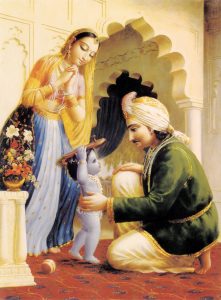 in the heart of the gopīs, Yaśodā Maiyā, Nanda Bābā, and Subala and Śrī Kṛṣṇa’s other friends. When the devotee meditates on Śrī Kṛṣṇa with a longing for the moods of these associates, their moods enter his heart.
in the heart of the gopīs, Yaśodā Maiyā, Nanda Bābā, and Subala and Śrī Kṛṣṇa’s other friends. When the devotee meditates on Śrī Kṛṣṇa with a longing for the moods of these associates, their moods enter his heart.
kṛṣṇaṁ smaran janaṁ cāsya
preṣṭhaṁ nija-samīhitam
tat-tat-kathā-rataś cāsau
kuryād vāsaṁ vraje sadā
(Bhakti-rasāmṛta-sindhu 1.2.294)
One should always think of Kṛṣṇa within oneself and should choose a very dear devotee who is a servitor of Kṛṣṇa in Vṛndāvana. One should constantly engage in topics about that servitor and his or her loving relationship with Kṛṣṇa, and one should live in Vṛndāvana. If one is physically unable to go to Vṛndāvana, he should live there mentally.
An explanation of the verse beginning with śuddha-sattva viśeṣātmā is given in the following books of Śrīla Bhaktivedānta Nārāyaṇa Mahārāja:
“In Bhakti-rasāmṛta-sindhu (1.3.1) it is stated, śuddha-sattva viśeṣātmā prema-sūryāṁśu-sāmyabhāk rucibhiś citta-māsṛṇya-kṛd asau bhāva ucyate. When the heart becomes melted by ruci, or in other words, an intense longing to attain the Lord, then what was previously sādhana-bhakti is now called bhāva-bhakti. The primary characteristic of bhāva is that it is a phenomena constituted entirely of viśuddha-sattva (unalloyed goodness), and as such it is compared to a ray of the sun of premabhakti. The conclusion established by this verse is that bhāva-bhakti or rati is the sprout of prema and an atom of prema.
“In its initial stage, prema is called bhāva. In that stage, various transformations of ecstasy arising from viśuddha-sattva (sattvika-bhāvas) such as tears, standing of the hairs of the body on end, etc., are observed to a very slight extent” (Śrī Śikṣāṣṭaka, Verse 6, Sanmodana-bhāṣya).
The above-mentioned definition of bhāva-bhakti is also given in Jaiva-dharma, Chapter 22. Here, śuddha-sattva and viśuddha-sattva have been used interchangeably:
“The characteristic feature of bhāva is that it is situated in unalloyed goodness (śuddha-sattva-viśeṣa-rūpa-tattva). It can be compared to a tiny ray of the prema-sun.
“The constitutional characteristic (svarūpa-lakṣaṇa) of bhāva is that it is situated in unalloyed goodness (viśuddha-sattva). Bhāva is also known by the name rati, and is sometimes called a sprout of prema (premāṅkura). The propensity for divine knowledge (saṁvit-vṛtti) is an aspect of the all-enlightening internal potency (svarūpa-śakti), and is the state of unalloyed goodness (śuddha-sattva), having no connection with māyā. When this saṁvit-vṛtti combines with the propensity for unalloyed bliss (hlādinī-vṛtti), the essential aspect of that combination is called bhāva.”
“Sattva can also mean that everything in the spiritual world is viśuddha-sattva, comprised of pure spiritual energy. There is not a touch of mundane qualities of goodness (sattva), passion (rajas), or ignorance (tamas) in that realm. There are so many objects in Vaikuṇṭha, and they are all viśuddha-sattva. Especially it is known as the essence of the hlādinī and saṁvit potencies combined, which is found in the hearts of the eternal rāgātmikā devotees there. If greed arises in the heart of a living entity for the sentiment of those devotees, and he performs bhajana following in their footsteps, then, when even one molecule of their devotion reflects into his heart, it can be called sattva. There are three kinds of sattva: viśuddha-sattva, sattva, and miśra-sattva (miśra means ‘mixed’). Miśra-sattva exists within the conditioned souls, sattva within the liberated souls who have not yet developed bhakti, and viśuddha-sattva within the dhāma and Bhagavān’s eternal associates” (Bhakti-rasāyana, Chapter 2).
“Only after the jīva attains svarūpa-siddhi and will imminently enter into vastu-siddhi can it be said that he is in viśuddha-sattva. Bhagavān and all of His devotees in Vaikuṇṭha, whether they are peacocks or monkeys or whatever, are situated in viśuddha-sattva” (Bhakti-rasāyana, Chapter 2).
“By the essence of the hlādinī and saṁvit potencies together, this sentiment arises in the heart of a jīva. This is called viśuddha-sattva, and this is the activity of Yogamāyā. She performs unlimited types of service in Vaikuṇṭha, Dvārakā, Mathurā, and finally in Vṛndāvana” (Going Beyond Vaikuntha, Chapter 8).
“The saṁvit function of the self-manifesting svarūpa-śakti is called śuddha-sattva. Bhāva imbued with very thick mamatā (possessiveness) for Kṛṣṇa is the special function of the hlādinī aspect of cit-śakti. That supremely astonishing bhāva which arises when these two mix together in the heart of the pure jīva is called viśuddha-prema” (Bhakti-tattva-viveka, Part 5).
“Karya-rūpa refers to endeavours that manifest as effects upon attainment of the stage of bhāva, or in other words the anubhāvas of bhāva-bhakti. Included within this category are the eight sāttvika-bhāvas, such as crying and standing of the hairs on end, and the anubhāvas such as singing and dancing. All these effects (anubhāvas) are expressions arising from the mind that is constituted of viśuddha-sattva” (Bhaktirasāmṛta-sindhu-bindu, Verse 1, Śrī Bindu-vikāśinī-vṛtti).
The statements from the above-mentioned endnote, taken from Śrīla Bhaktivedānta Nārāyaṇa Mahārāja’s books, are examples of śuddha-sattva and viśuddha-sattva being used interchangeably. These statements reveal that even a jīva at the stage of bhava-bhakti is situated in viśuddha-sattva, what to speak of a jīva who has attained prema and becomes a resident of Goloka Vṛndāvana. How, then, do we understand Śrīla Bhaktivedānta Nārāyaṇa Mahārāja’s words in this June 16, 2008 morning walk? How is this reconciled? The answer is that there is actually no contradiction.
In his Harināmāmṛta-vyākaraṇa, Śrīla Jīva Gosvāmī shares with us the following logic: “Pūrva-parayor madhye para-vidhir balavān – When there are so many statements supporting an accepted siddhānta, and also statements which are less in number and seemingly different from the accepted siddhānta, those statements which are large in number and which accord with siddhānta have higher value.” What, then, does Śrīla Bhaktivedānta Nārāyaṇa Mahārāja mean when he says that the jīva cannot be viśuddha-sattva?
As quoted in the above sastric statements, viśuddha-sattva is the essence of saṁvit and hlādinī (which is called bhakti). This is manifest to the fullest extent in Śrīmatī Rādhārāṇī and Her nitya-siddha kāya-vyūha associates, and to a lesser extent in Kṛṣṇa. This same principle can be applied to Nanda Bābā and Śrī Yaśodā Maiyā. In other words, Śrīla Bhaktivedānta Nārāyaṇa Mahārāja’s beautiful statements may be understood by taking the meaning of the word viśuddha-sattva to be ‘pure, unalloyed bhakti.’ With this consideration, we can understand that Śrī Kṛṣṇa is viśuddha-sattva, Śrī Nanda Bābā and Mother Yaśodā are viśuddha-viśuddha-sattva, and Śrīmatī Rādhārāṇī and Her kāya-vyūha gopīs are viśuddha-viśuddha-viśuddha-sattva.
The jīva can never attain the greatness of Śrīmatī Lalitā-devī’s position, or Rūpa Mañjarī’s position, or Mother Yaśodā’s position, or the positions of any such eternal associates of Kṛṣṇa – these positions are already taken.
In that sense, the jīva is always śuddha-sattva and never viśuddha-sattva. This is also true for Śrī Hanumān. He is viśuddha-sattva, as Śrīla Bhaktivedānta Nārāyaṇa Mahārāja mentions above, because he the topmost among all dāsya-bhaktas as well as an expansion of Lord Viṣṇu’s form known as Sadāśiva. No jīva can become an expansion of Sadāśiva; in that sense the jīva can only be śuddha-sattva, or in a position lower than Him.
The pinnacle of a jīva’s attainment is that he can be tadātmā with these associates. [Please see Alachua, May 4, 2008 – Morning Walk.] Taking a look at the following conversation with this perspective, we may get a glimpse of Śrīla Bhaktivedānta Nārāyaṇa Mahārāja’s mood in this regard:
Devotee: What is the ingredient that makes the difference between śuddha-sattva and viśuddha-sattva?
Śrīla Bhaktivedānta Nārāyaṇa Mahārāja: The jīva can go up to śuddha-sattva; he cannot be viśuddha-sattva. 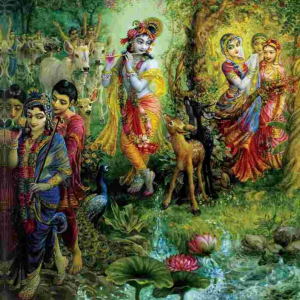 Vāsudeva (Kṛṣṇa) is viśuddha-sattva, and Nanda Bābā is viśuddha-viśuddha-sattva [i.e. Kṛṣṇa is God, so He is superior to us, and Nanda Bābā is superior to Kṛṣṇa in bhakti].
Vāsudeva (Kṛṣṇa) is viśuddha-sattva, and Nanda Bābā is viśuddha-viśuddha-sattva [i.e. Kṛṣṇa is God, so He is superior to us, and Nanda Bābā is superior to Kṛṣṇa in bhakti].
Savitā dāsī: And the gopīs are viśuddha-viśuddha-viśuddha sattva [i.e. the gopīs are superior to Nanda Bābā in bhakti].
Śrīla Bhaktivedānta Nārāyaṇa Mahārāja: Yes.
Devotee: Even when the jīva goes to Goloka Vṛndāvana, does he still stay as śuddha-sattva?
Śrīla Bhaktivedānta Nārāyaṇa Mahārāja: The jīva is always śuddha-sattva, but he can be tadātmā (one in quality) with viśuddha-sattva. By the power of svarūpa-śakti – saṁvit, and hlādinī– he can work as viśuddha-sattva, but he is śuddha-sattva. This existence in pure goodness fully blooms at the stage of prema. It first manifests at the stage of bhāva, then further in prema, and then still further in sneha, māna, praṇaya, and so on.
Śrīla Prabhupāda Bhaktivedānta Svāmī Mahārāja confirms this understanding in his Tenth Canto Śrīmad-Bhāgavatam purport (10.8.49). There he writes, “In other words, it is not possible for a sādhana-siddha living being to become the father or mother of Kṛṣṇa, for Kṛṣṇa’s father and mother are already designated. But by following the principles exhibited by Nanda Mahārāja and Yaśodā and their associates, the inhabitants of Vṛndāvana, ordinary living beings may attain such affection as exhibited by Nanda and Yaśodā.”
“In the mode of pure goodness (viśuddha-sattva) the Vāsudeva form of the Lord is manifest. Lord Śiva describes this in the Fourth Canto, Chapter Three (Śrīmad-Bhāgavatam 4.3.23):
“An explanation of this verse follows. The word viśuddha here means ‘because it is the Lord’s internal potency it is free from even the slightest touch of matter,’ and that is why the adjective śuddha (pure) is used here. This viśuddha-sattva is here called ‘vāsudeva-sattva.’ Why is it called vāsudeva-sattva? Because the Supreme Personality of Godhead (pumān) Lord Vāsudeva is manifest (īyate) because of it (yat).
“Firstly, the word sattva is used here because this potency manifests the Supreme Truth and is thus like the sattva (goodness) that enables the unseen to be seen in this world. Secondly, the word vāsudeva is used because this potency enables one to understand the Supreme Personality of Godhead, Lord Vāsudeva. These two words are then put together into vāsudeva-sattva, which is the same as viśuddha-sattva (pure goodness)” (Bhagavat-sandarbha, Anuccheda 103).
Image/Art made possible by Pixabay.com & Krishnapath.org








